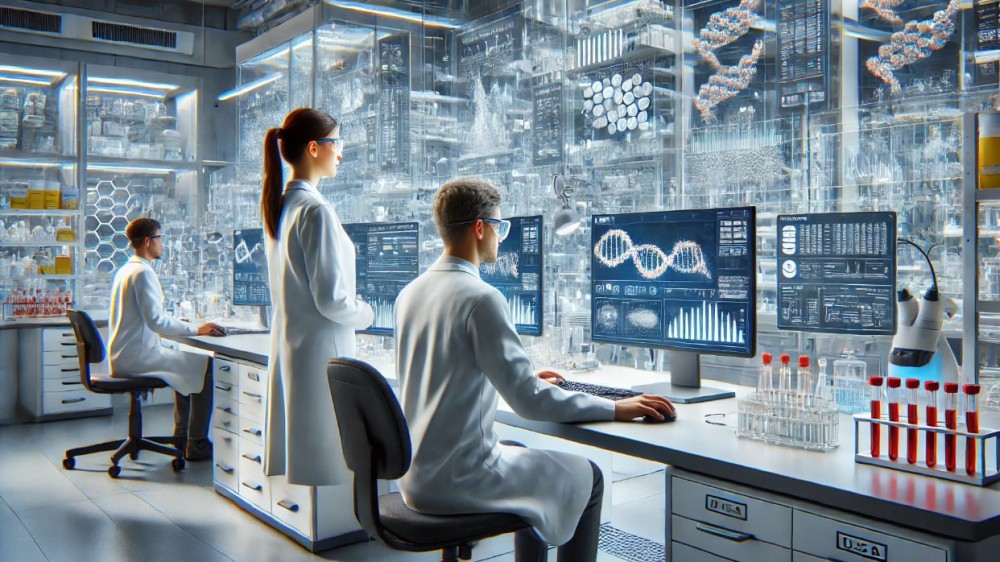As the boundaries between biology and technology continue to blur, a new frontier is emerging that promises to revolutionize industries across the board: biocomputing. Biocomputing, which leverages the mechanisms of biological systems for computing processes, is ushering in an era where living organisms and technology work in tandem to process information, solve problems, and create innovative solutions. While the concept may seem distant from the immediate world of IT recruitment, the reality is quite the opposite. This convergence of biology and computing is not just creating new markets and industries but is also reshaping the demand for specialized IT talent.
For IT recruitment firms, such as ours, the implications of biocomputing are both profound and promising. The rise of this field means that the skills required by companies are evolving rapidly, and recruiters must be at the forefront of understanding the technical, interdisciplinary expertise that companies will seek. But before we dive into how biocomputing is transforming the hiring landscape, let’s take a closer look at what this fusion of biology and computing entails.
What Is Biocomputing?
Biocomputing is the use of biological processes and materials to perform computational tasks. In this emerging field, scientists and engineers are using living systems—like DNA, proteins, and cells—as computing devices. Unlike traditional computing, which relies on silicon-based chips and binary logic, biocomputing harnesses the natural processes of biology to solve complex problems in ways that conventional computers cannot.
One of the most promising areas of biocomputing is DNA computing. Here, DNA molecules are used to store and process information. This approach can solve mathematical problems at speeds far beyond traditional computers, using the massive parallelism inherent in biological systems. For example, researchers have already demonstrated how DNA strands can be manipulated to solve specific optimization problems or even encrypt data.
Another area is neural computing, which seeks to build computers that mimic the architecture of the human brain. While neural networks in AI are already widely used in technology, biocomputing aims to replicate the actual biological mechanisms of neurons and synapses to create more efficient, powerful, and possibly even sentient machines.
Other innovations in this space include synthetic biology, where living cells are engineered to perform computational functions or to produce valuable substances like medicines or biofuels.
The Expanding Role of Biocomputing in Industry

Biocomputing is still in its early stages, but its potential applications are vast. From healthcare to agriculture, finance to energy, the fusion of biology and computing is expected to disrupt industries and create entirely new business models. For instance:
- Healthcare: Biocomputing could revolutionize personalized medicine, enabling treatments that are specifically tailored to an individual’s genetic makeup. This will require immense computational power that traditional systems might not be able to handle, but biological systems could process efficiently.
- Environmental Solutions: Biocomputing may lead to breakthroughs in synthetic biology that allow the creation of bioengineered organisms capable of cleaning up pollution, producing biofuels, or even capturing carbon emissions.
- Data Storage: DNA, as a medium for information storage, holds the promise of storing vast amounts of data in tiny spaces. It’s estimated that just one gram of DNA could theoretically store around 215 petabytes of data, making it an attractive solution for industries struggling with massive data storage needs.
These applications are already fueling demand for biocomputing experts, and the need for skilled IT personnel will only grow as more companies venture into this space.
The Impact of Biocomputing on IT Recruitment
As biocomputing continues to evolve, it is reshaping the job market. This interdisciplinary field requires a blend of expertise in both biology and computer science, creating a new demand for IT professionals who can navigate this hybrid world. For IT recruitment firms, the challenge is clear: identify and attract candidates with these cutting-edge skills while keeping pace with a rapidly changing landscape.
Emerging Skills in Biocomputing
Biocomputing requires a combination of skills that are not traditionally found in most IT professionals. Here's what companies will be looking for as biocomputing continues to take hold:
- Bioinformatics: This discipline, which combines biology, computer science, and information technology, is critical to biocomputing. Bioinformaticians develop algorithms and software for understanding biological data, particularly in genomics and DNA computing. IT professionals with experience in data science and biology will be in high demand.
- Systems Biology: IT professionals who can design, model, and simulate biological systems will become increasingly valuable. These candidates will need expertise in systems engineering, machine learning, and biological sciences.
- AI and Machine Learning: Biocomputing systems rely heavily on machine learning and AI to process and interpret data, particularly in neural computing. As a result, demand for AI specialists who understand biological applications will skyrocket.
- Software Development for Biological Systems: Just as traditional IT systems require custom software, so too do biocomputing platforms. Developers who can write code that interacts with biological processes will be essential to the success of companies in this space.
- Hardware Development: Biocomputing will also require hardware specialists who can create systems capable of interfacing with biological materials. These professionals will need to bridge the gap between silicon-based technologies and organic systems, which requires a unique blend of bioengineering and traditional IT skills.
Rethinking Recruitment Strategies
The rise of biocomputing requires recruitment agencies to rethink their traditional strategies. While the focus has traditionally been on sourcing candidates with strong computer science and software development backgrounds, we now need to look for professionals with a broader, interdisciplinary skill set. This could mean:
- Cross-Disciplinary Sourcing: We will need to recruit not just from the IT sectors but also from the biological and medical fields. Candidates with dual degrees or experience in both biology and computer science will be particularly valuable.
- Collaborations with Universities: Biocomputing is still emerging, and much of the talent pipeline is being formed at research universities and within startup ecosystems. Establishing partnerships with academic institutions and research centers could be key to finding and nurturing talent in this field.
- Upskilling and Training Programs: As demand for biocomputing specialists grows, companies may need to invest in upskilling their existing IT teams. Offering training programs or certifications in bioinformatics, synthetic biology, and related areas could help bridge the talent gap.
- Adapting Job Descriptions: As new roles emerge, recruitment firms will need to ensure that job descriptions accurately reflect the unique qualifications required for biocomputing positions. This may include collaborating closely with clients to understand their specific needs and ensuring candidates are fully briefed on the interdisciplinary nature of the work.

Biocomputing: The Future of IT Recruitment
For IT recruitment companies, the rise of biocomputing represents an exciting opportunity. The fusion of biology and computing will create new roles, new markets, and new challenges—both for the companies developing these technologies and the recruiters tasked with finding the right talent. Staying ahead of this trend will be crucial, not only to meet the growing demand for specialized professionals but also to ensure that recruitment firms are positioned as leaders in an emerging field that is poised to redefine industries.
In a world where biological and digital systems increasingly converge, the future of IT recruitment lies in understanding the new skills and competencies required to power the next wave of technological advancement. Biocomputing may still be in its infancy, but its impact is already being felt, and recruitment firms that embrace this change will be at the forefront of helping companies navigate this brave new world.
At our recruitment firm, we’re already preparing for this shift by cultivating relationships with candidates who possess the hybrid skills needed for biocomputing, while also staying attuned to the latest developments in this groundbreaking field. The fusion of biology and computing isn't just the future of technology—it’s the future of IT recruitment.


